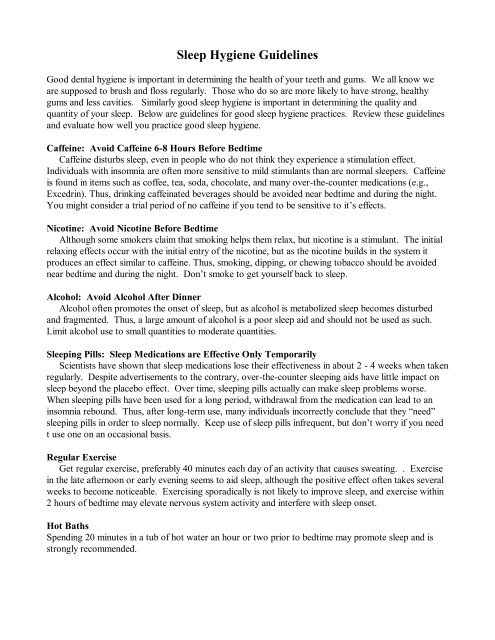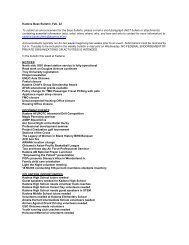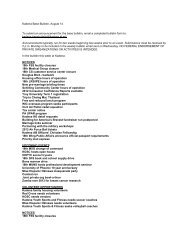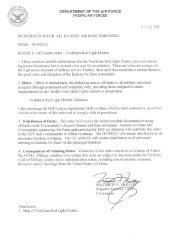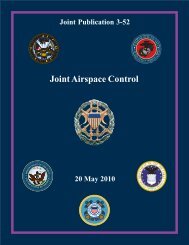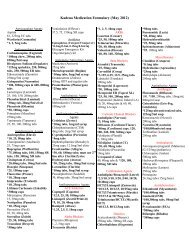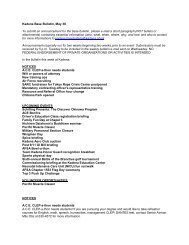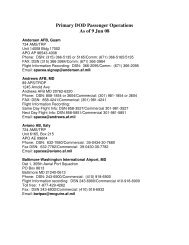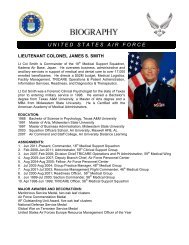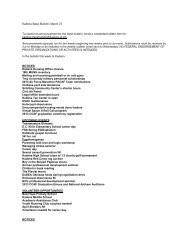Sleep Hygiene Guidelines
Sleep Hygiene Guidelines
Sleep Hygiene Guidelines
You also want an ePaper? Increase the reach of your titles
YUMPU automatically turns print PDFs into web optimized ePapers that Google loves.
<strong>Sleep</strong> <strong>Hygiene</strong> <strong>Guidelines</strong><br />
Good dental hygiene is important in determining the health of your teeth and gums. We all know we<br />
are supposed to brush and floss regularly. Those who do so are more likely to have strong, healthy<br />
gums and less cavities. Similarly good sleep hygiene is important in determining the quality and<br />
quantity of your sleep. Below are guidelines for good sleep hygiene practices. Review these guidelines<br />
and evaluate how well you practice good sleep hygiene.<br />
Caffeine: Avoid Caffeine 6-8 Hours Before Bedtime<br />
Caffeine disturbs sleep, even in people who do not think they experience a stimulation effect.<br />
Individuals with insomnia are often more sensitive to mild stimulants than are normal sleepers. Caffeine<br />
is found in items such as coffee, tea, soda, chocolate, and many over-the-counter medications (e.g.,<br />
Excedrin). Thus, drinking caffeinated beverages should be avoided near bedtime and during the night.<br />
You might consider a trial period of no caffeine if you tend to be sensitive to it’s effects.<br />
Nicotine: Avoid Nicotine Before Bedtime<br />
Although some smokers claim that smoking helps them relax, but nicotine is a stimulant. The initial<br />
relaxing effects occur with the initial entry of the nicotine, but as the nicotine builds in the system it<br />
produces an effect similar to caffeine. Thus, smoking, dipping, or chewing tobacco should be avoided<br />
near bedtime and during the night. Don’t smoke to get yourself back to sleep.<br />
Alcohol: Avoid Alcohol After Dinner<br />
Alcohol often promotes the onset of sleep, but as alcohol is metabolized sleep becomes disturbed<br />
and fragmented. Thus, a large amount of alcohol is a poor sleep aid and should not be used as such.<br />
Limit alcohol use to small quantities to moderate quantities.<br />
<strong>Sleep</strong>ing Pills: <strong>Sleep</strong> Medications are Effective Only Temporarily<br />
Scientists have shown that sleep medications lose their effectiveness in about 2 - 4 weeks when taken<br />
regularly. Despite advertisements to the contrary, over-the-counter sleeping aids have little impact on<br />
sleep beyond the placebo effect. Over time, sleeping pills actually can make sleep problems worse.<br />
When sleeping pills have been used for a long period, withdrawal from the medication can lead to an<br />
insomnia rebound. Thus, after long-term use, many individuals incorrectly conclude that they “need”<br />
sleeping pills in order to sleep normally. Keep use of sleep pills infrequent, but don’t worry if you need<br />
t use one on an occasional basis.<br />
Regular Exercise<br />
Get regular exercise, preferably 40 minutes each day of an activity that causes sweating. . Exercise<br />
in the late afternoon or early evening seems to aid sleep, although the positive effect often takes several<br />
weeks to become noticeable. Exercising sporadically is not likely to improve sleep, and exercise within<br />
2 hours of bedtime may elevate nervous system activity and interfere with sleep onset.<br />
Hot Baths<br />
Spending 20 minutes in a tub of hot water an hour or two prior to bedtime may promote sleep and is<br />
strongly recommended.
Bedroom Environment: Moderate Temperature, Quiet, and Dark<br />
Extremes of heat or cold can disrupt sleep. A quiet environment is more sleep promoting than a<br />
noisy one. Noises can be masked with background white noise (such as the noise of a fan) or with<br />
earplugs. Bedrooms may be darkened with black-out shades or sleep masks can be worn. Position<br />
clocks out-of-sight since clock-watching can increase worry about the effects of lack of sleep. Be sure<br />
your mattress is not too soft or too firm and that your pillow is the right height and firmness.<br />
Eating<br />
A light bedtime snack, such a glass of warm milk, cheese, or a bowl of cereal can promote sleep.<br />
You should avoid the following foods at bedtime: any caffeinated foods (e.g., chocolate), peanuts,<br />
beans, most raw fruits and vegetables (since they may cause gas), and high-fat foods such as potato<br />
chips or corn chips. Avoid snacks in the middle of the nights since awakening may become associated<br />
with hunger.<br />
If you have trouble with regurgitation, be especially careful to avid heavy meals and spices in the<br />
evening. Do not go to bed too hungry or too full. It may help to elevate you head with some pillows.<br />
Avoid Naps<br />
Avoid naps, the sleep you obtain during the day takes away from you sleep need that night resulting<br />
in lighter, more restless sleep, difficulty falling asleep or early morning awakening. If you must nap,<br />
keep it brief, and take the nap about 8 hours after arising. It is best to set an alarm to ensure you don’t<br />
sleep more than 10-15 minutes.<br />
Limit Your Time in Bed<br />
Restrict your sleep period to the average number of hours you have actually slept per night during<br />
the preceding week. Quality of sleep is important. Too much time in bed can decrease the quality on<br />
subsequent night and contribute to the maintenance of existing sleep problems. Don’t lay in bed for<br />
extended times not sleep. If you aren’t asleep in about 15-20 minutes go ahead and get up. Do<br />
something outside the bedroom that is relaxing. When you feel sleepy (i.e., yawning, head bobbing,<br />
eyes closing, concentration decreasing, then return to bed. Don’t confuse tiredness with sleepiness, they<br />
are different. Tiredness doesn’t lead to sleep, only sleepiness does.<br />
Regular <strong>Sleep</strong> Schedule<br />
Keep a regular time each day, 7 days a week, to get out of bed. Keeping a regular awaking time<br />
helps set your circadian rhythm set so that your body learns to sleep at the desired time.<br />
Use the attached form to develop a plan for improving you sleep<br />
hygiene. It will take time for you sleep to get back in line so once you begin<br />
your sleep hygiene plan, stick with if for at least 6-8 weeks.
Check Those<br />
That Apply<br />
Planned Improvements of My <strong>Sleep</strong> <strong>Hygiene</strong><br />
_____ Avoid Caffeine 6-8 Hours Before Bedtime. I will not have caffeine after ________ PM.<br />
____ Avoid Nicotine Before Bedtime. I will not have a cigarette after _________ PM.<br />
______ Limit Alcohol Use. I will not have more than _______ drinks in the evening.<br />
______ Avoid Use of <strong>Sleep</strong>ing Pills. (If you are currently using them regularly, all changes should be<br />
medical supervised by your medical provider).<br />
______ Do Exercise Regularly, But Not Within 2 Hours of Bedtime. I ________________ for ____<br />
minutes, on the following days ____________________________________________________<br />
______ Ensure your Bedroom is a Comfortable Temperature, Quiet, and Dark and Your<br />
Mattress and Pillow are good. I will make the following changes to my bedroom<br />
____________________________________________________________________________<br />
______ Do Take a Hot Bath 1-2 Hours Prior to Bedtime. I will take a hot bath about ______ PM.<br />
______ Eat a Light Snack at Bedtime but Avoid Large or Problematic Foods. I will eat<br />
__________________ or _____________________ or __________________ before bed.<br />
______ Avoid Naps. I try not to nap, if I must, I will limit it to _______ minutes, about 8 hours after I<br />
awoke and will use alarm to limit my nap time.<br />
______ Limit Time In Bed. I have been sleeping on average ______ hours per night, therefore I will<br />
limit my time in bed to _____ hours (the same number). If I’m not asleep in about 15 to 20<br />
minutes I will get up and not return to bed until I’m sleepy.<br />
______ Stay on a Regular <strong>Sleep</strong> Schedule I will get up at _______ AM, 7 days a week, no matter<br />
how poorly I slept that night.


